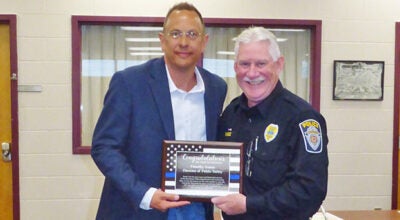Former Dowagiac resident ATA’s highest-ranked African-American
Published 10:41 am Wednesday, December 2, 2009

Before God called him to Arkansas 20 years ago, Richard Anderson operated five taekwondo schools in Michiana — Cassopolis, Decatur, Niles, Buchanan and Mishawaka. Anderson, who was home for a Thanksgiving visit, recalls such positive influences in his life as coaches Jack McAvoy and John Lewis and teacher Annabelle Neidlinger. Anderson was interested in teaching, but didn’t possess the confidence to pursue that career then. His mother, Mary Lee Anderson, still lives in Dowagiac. His sister, Marian, opened Kuts 2 Go salon for men, women and children, 103 Commercial St., behind Underwood Shoe Store on Aug. 20, 2008. Marian graduated from DUHS in 1968 with Olympic wrestler Chris Taylor. Richard, DUHS Class of 1969, was a counselor at Fitch Camp with Taylor. His daughter, Rashena Janea Anderson Johnson, is a second-degree black belt who lives in Niles and has given him three grandsons, Jayden, Kalen and Jayson. Rashena works at the front reception desk at the Niles YMCA. Richard, sixth of seven kids, is the first African American eighth-degree black-belt master in the world.
By JOHN EBY
Dowagiac Daily News
Chief Master Richard E. Anderson cannot climb any higher in taekwondo on his own.
The 1969 Union High School graduate, an All-State defensive back for Dowagiac’s football team coached by the late Jack McAvoy, is one of only 16 eighth-degree black belts and the highest-ranking African American out of 450,000 students of the ATA (American Taekwondo Association), WTTU (World Traditional Taekwondo Union) and STF (Singapore Taekwondo Federation).
The Martial Arts Hall of Famer was promoted to Senior Master status in the world’s largest martial arts association in 2001.
Saturday, Nov. 21, Gov. Mike Beebe proclaimed “Chief Master Richard E. Anderson Day.”
“That was pretty cool,” he said. “I was Arkansas Man of the Year twice, this year and last year,” Anderson said Friday afternoon.
There can be only one ninth-degree Grand Master at a time, so it’s kind of like being a cardinal in the Catholic church in line to perhaps be the next pope.
When Anderson visits his mother at 213 Halstead St. each Thanksgiving he does so with the assurance that he kept the promise he made Mary Lee Anderson at 9 that someday their name would be up in lights.
Anderson, who was impacting young lives such as Sinbad as a Fitch Camp counselor long before he arrived in Arkansas 20 years ago, in the 1980s operated five martial arts schools in Niles, Decatur, Buchanan, Cassopolis and Mishawaka, Ind.
His success in molding character is widely recognized in Little Rock, where Mayor Jim Dailey proclaimed “Richard E. Anderson Day” in 2001.
Beebe appointed him commissioner of the Arkansas State Athletic Commission in 2008.
KATV Channel 7 in 2008 named Anderson “Arkansan of the Week.”
Succeeding in the South as a black man means something to Anderson, who in an interview in the lobby of Baymont Inn and Suites, noted he lives “not even a mile” from Little Rock Central High School.
“There’s a lot of history there,” he said, referring to the September 1957 showdown between President Dwight D. Eisenhower and Gov. Orval Faubus in which the military forced desegregation by escorting nine students into the school.
Anderson’s Taekwondo Center Camp Positive is a non-profit marital arts school which runs a high-profile program with about 120 members.
He offers a program to inner-city youth and their families which strengthens them through the moral standards of the ATA. He emphasizes the motto, “Go to Church on Sunday, Practice Free on Monday.”
Anderson has been a black belt for more than 37 years.
“It took me a year and 16 months to make black belt. Back in those years, you could skip a rank if your abilities allowed it,” he said.
His interest in martial arts grew out of playing “I Spy” with Jerry Parker. Anderson always emulated Bill Cosby.
“We got all of the books out of the library and studied kicking and punching,” Richard recalled. “Jerry’s dad was in martial arts in the service, so he would show us a kick or two, but he had a bad back.”
“The Green Hornet” with Bruce Lee as Kato, a newspaper publisher’s valet, was another early influence.
“We were very poor so I could not afford to go to an established school” like Kim’s Karate Academy on U.S. 31 just across the state line, said Anderson, who had his Niles school on the same highway just inside Michigan by 1983-1984.
“I left the area in 1989,” he said. “I didn’t pick Arkansas. Arkansas picked me.
“We used to take a busload and go to national tournaments there. It was a nice place to visit, but nowhere I wanted to live. I had gotten out of going to church as much as when I was growing up and I was into martial arts. I was pretty successful. It seemed like everything I touched turned to gold.
“I woke up early one morning about 3 o’clock with my hair standing up on my head. The hair on my arms was raised up. And I heard a voice telling me I needed to go to Arkansas. ‘My children are killing themselves over red and blue colors.’ I told my mother and she said, ‘That’s God talking to you. You’ve got to listen.’ I wasn’t going to go to Arkansas, but it happened a second and third time.”
Around the same time, “I had this brilliant idea of how to organize and construct a judging certification program for the martial arts,” Anderson said. “One of the biggest problems in tournaments at that time was judging seemed to be unfair. If you were a black belt you were a judge – whether you knew how to judge or not. Consequently, that caused a lot of bad calls and kids were crying. Tournament hosts and the organization were getting bad names. I had a plan laid out in my mind that was everything we needed.”
“We staged a tournament in Chicago and brought the Grandmaster,” Anderson said. “It ran so smoothly he brought me to Little Rock, where I became the first African American executive vice president of the organization. I have two schools and three clubs. One school is in Pine Bluff and is being run by a student at the University of Pine Bluff and a graduate. I run the one in Little Rock, where we also have different elementary schools we sent instructors out to.
“(Eight-week) Camp Positive was a program I instructed in the summertime to get kids off the street. Here, I had a client base that had money to pay for martial arts. There, I’m in the inner city. They construct programs the kids can come to in the martial arts, so long as they keep their nose clean in school and don’t get in trouble. No sagging of those pants. I go visit elementary, middle and high schools and monitor to see our students are doing what they’re supposed to be doing.”
To a comparison with the Dowagiac Boxing Club formed with Muhammad Ali’s ring, Anderson said, “He was definitely one of my idols. When I first got my start in Benton Harbor at a real martial arts school, my instructor was Alvin Smith, a first-degree black belt in taekwondo and a third-degree black belt in kung fu. We worked in the factory at Whirlpool together. There was something different about him. The foreman would always mess with the rest of us. We couldn’t figure out how he always got nicer jobs and longer time for breaks. It was the way he carried himself.
“When he opened up a school, I was his first student. It was in the basement of a church with a marble floor. I’ll never forget that. I was there every night. I lived in Dowagiac and drove to Benton Harbor and worked out for two to three hours.”
“Some people are mechanically inclined to work on cars or have an ear for music,” he says. “I always had a knack for self-defense and martial arts. There was virtually no way you could put your hands on me, even as a little kid. I was small, but fast.”
He demonstrates a pressure point by placing one finger on my chest and disabling me with a crushing sensation.
“I picked Chris Taylor up and threw him out at (Fitch Camp),” recalled Anderson, who expected to end up a hand-to-hand combat instructor in the Army. “That was my dream of what I thought I would be after playing football. All that changed with Alvin Smith. I ate and slept martial arts. I didn’t date for a year.”
Asked whether anyone ever messed with him who didn’t know what was in store, Anderson answers, “I’ve made more friends than enemies because of martial arts. It changes your nature – the way you look, the way you walk, your mannerisms. It’s like if a person knows a stove is hot they don’t put their hand on it. The way you carry yourself, they know not to mess with you,” in contrast to my “calm, gentle” aura he reads walking through the door at Baymont. “When you’re in martial arts a while, you start to read these things and know people and know who you can let your hair down around.”
Anderson indicates that taekwondo is not part of the Olympics, which are for sports, because taekwondo is a “way of life.”
It takes two years of study to advance from black belt to first-degree. Each subsequent degree takes longer, topping out at seven years for eighth-degree.
Sixth-degree connotes “master,” seventh-degree “senior master” and eighth-degree “chief master.”
Yes, there are more colors than before – white, orange, yellow, camo(uflage), green, purple, blue, brown – as the children involved kept getting younger.
“The youngest in my class is 1 1/2,” he notes. “I seek to develop a balance and develop their minds so they’re not leaning towards gangs and other activities that are out there and not wanting to learn and study or go to school. When you’ve got first and second graders getting kicked out of school … You’ve got young people 13, 15 or 16 having children. They haven’t been raised properly. Their mom had them when she was 17. That cycle hasn’t been broken. A lot of kids can’t read and they have attention spans of seven minutes. If you’re not educated, you may end up on the street, trying to take what you’ve got because you’re unable to get a job yourself. But a child who learns basic skills is going to love school and want to be in the classroom.”
Anderson envisioned himself playing college football, but he ended up at Southwestern Michigan College, which lacked a grid team and had yet to develop as a track powerhouse under Ron Gunn.
“I would have loved to have been a teacher. That was always a thought, but I never thought I was smart enough. Teachers, in my mind, had to be seriously smart. Teach them basic skills so they feel good about themselves and want to learn to read and do math problems. You fix them for the long haul and they’ll be raising their hand in class and answering questions. They may end up going to college. In the last two years, we graduated 63 kids out of high school and college. You don’t read about that.”
In sandlot football he consciously surrounded himself with lesser players, his motivation to win being their secret weapon.
Bill Cosby is another of Anderson’s heroes.
“He’s phenomenal,” Richard said. “I didn’t get close enough to shake hands, but he was in Little Rock. At the rank of seventh-degree I can make people honorary black belts. I really wanted to do that for Mr. Cosby because he’s been an idol of mine for so long, but it never came to pass.”
“My mom and the neighborhood” kept Anderson on the straight and narrow in Dowagiac. “Kenneth Wilson’s mom and dad. If a parent saw you doing something wrong,” by the time he reached his house, his mother had been informed and he was in twice as much trouble.
“That type of support system” kept kids in line.
“My oldest sister, who passed away in October ’76, she showed me how to study. I was fast and played sports and thought I was a dumb kid. I thought I didn’t have to read and write if I could throw and catch a football. Coach McAvoy and John Lewis were my heroes. I remember sitting in Coach McAvoy’s history class. I couldn’t spell or take notes well.”
He remembers being thumped in the head with a big book when he didn’t know an answer.
Another teacher he vividly remembers is Annabelle Neidlinger, whose son, Joe, went on to the Michigan State Police, was also an athletic standout.
“When she taught over at McKinley, I was sure enough being the class clown that day,” he chuckles. “I remember standing up in the chair and she told me to sit down. That lady slapped me so hard. But we became close and she became one of my favorite teachers. I remember my brother Roger and I in Cub Scouts made a kite and whoever flew it the highest won an airplane ride. I won. That kite might be on the moon. She was there to watch me make that flight and she wrote a note to the pilot: ‘Make him have a good time.’ That was a great experience and a big turning point in my life.”
Also influential was James Mosier, who would serve as Dowagiac mayor as well as Anderson’s principal.
If memory serves, it was Kathy Huff, Councilman Dr. Charles Burling’s future wife, who helped him with note-taking because they had known each other since McKinley Elementary School.
“We had that bond, which is why I believe it was her,” he said.
Anderson knew Sinbad, aka future comedian David Adkins, from the McKinley neighborhood until his pastor father moved the family to Benton Harbor.
“His dad baptized me,” Anderson said. “When they moved to Benton Harbor and then I ended up going to Benton Harbor, I ended up becoming part of their church there. Every year we have three major martial arts tournaments” in Las Vegas, Orlando and Little Rock.
“We were taking students to Vegas and I saw (Sinbad) was headlining at the Riviera Hotel,” Anderson said. “I called Benton Harbor and got in touch with his dad. Me and about 13 or 14 of my adult students were up in the balcony. He was out on stage doing his stuff. When there was a little break, we shouted, ‘Dowagiac, Mich.!’ ”
Anderson expected to be in town until Sunday morning.
Before heading back to Arkansas, he drills his grandson, 11, a 14-year-old red-belt student and 11-year-old twins who are third-degree black belts.
“College-bound,” they chorus in unison as they bow.
Anderson instructs them to repeat what they recite with “a little volume this time.”
They reel off poems about “being somebody” and keeping their “character clean” mixed with Bible verses.
The 11-year-old girl wipes sweat from the brow of one of the boys with an effortless round kick to the head as graceful as a ballerina.
People entering Baymont’s lobby pause, rooted in place while assessing this unusual sight and deciding whether it is safe to proceed.
Students respect Anderson with a disciplined “sir” to every one of his requests – Pierre drops to the floor and gives him 10 pushups – and reassure him they know stealing, cheating and lying make them “low-down dirty dogs.”
To drugs, drinking beer and wine, smoking cigarette or sagging their pants or piercing their bodies, talking back to parents or teachers, neglecting homework, they chorus, “Yuck! No sir,” with a snappy cadence.
Anderson tries to trip them up with one of his weaknesses, German chocolate cake, but without missing a beat they murmur, “Yum! Yum!”
They promise to never quit working hard or to quit anything they start.
“I’m a firm believer kids need to keep God in their heart and to know who He is,” Anderson said.
That’s why each color belt matches up with a specific scripture.
He readily acknowledges that the kind of respect and discipline he imparts would not be available to him if he was a conventional classroom teacher instead of a martial arts instructor.






